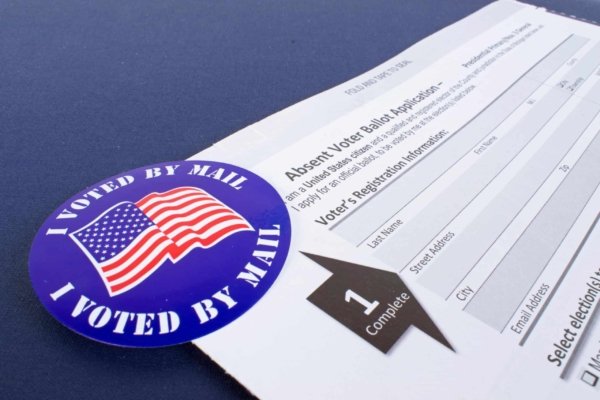
FOR IMMEDIATE RELEASE
August 4, 2020
For media inquiries:
Michelle Rash (SCSJ)
mrash@rlfcommunications.com
336-553-1733 (office)
336-823-5501 (mobile)
Rich Robinson (FEC)
rrobinson@fairelectionscenter.org
202-696-3406 (mobile)
Durham, N.C. — A federal judge has issued a preliminary injunction that will put in place some key measures to help ensure North Carolina voters will be able to cast their ballots safely in November’s General Election, even in the midst of the COVID-19 pandemic. The injunction entered by Judge William L. Osteen in Democracy North Carolina et al vs North Carolina State Board of Elections et al will help make sure all mail-in ballots are counted.
The Southern Coalition for Social Justice, Fair Elections Center and pro bono counsel from law firm WilmerHale are representing Democracy North Carolina, the League of Women Voters of North Carolina and eight individual voters in the lawsuit, which was filed in late May to help protect voters’ health and safety during the upcoming election.
Under the injunction, the legal team achieved victory for an individual plaintiff with a disability who will now be able to get the assistance he needs to vote from staff at his nursing home—help he is entitled to under federal law. Perhaps even more critically, the injunction also forbids local boards of election from rejecting mail-in ballots without notifying the voter and providing the voter with due process.
In the March 2020 primary, which was held prior to the onset of the quarantine due to COVID-19, nearly 15 percent of submitted mail-in ballots were rejected. At least 41 percent of these were for “curable” reasons, such as incomplete witness information or a signature mismatch.
In the 2016 General Election, there were 4.7 million votes cast in North Carolina, and a similar number is expected this year. North Carolina election officials expect 40 percent of voters to cast their ballots by mail this year, equating to about 2 million absentee ballots. If 15 percent of those ballots are rejected, that would be approximately 282,000 votes. Assuming that, as in the primary, 41 percent of those ballots are rejected for curable reasons, it would affect more than 115,000 votes.
“Judge Osteen clearly heard our argument that some people will have no choice but to vote absentee this election to protect their health. This ruling is important because it means that an estimated 115,000 votes that would have been rejected for potentially curable reasons will now be counted. We consider this a significant victory because it now prohibits the rejection of absentee ballots without due process,” said Allison Riggs, Chief Counsel for Voting Rights and Interim Executive Director of the Southern Coalition for Social Justice. “This ruling is especially significant for voters of color, who are disproportionately likely to have their absentee ballots rejected. This decision will help ensure these voters are heard in November, even in the midst of the COVID-19 pandemic.”
While Osteen did not grant all of the plaintiffs’ requests, in his ruling he acknowledged that the state of North Carolina needed to do more to ensure voter safety in advance of this year’s election.
“Plaintiffs have raised genuine issues of concern with respect to the November General Election. Should Legislative and Executive Defendants believe these issues may now be discounted or disregarded for purposes of the impending election, they would be sorely mistaken,” Osteen wrote.
He added: “The 2020 General Election is going to be a test of the North Carolina government’s thoughtfulness, adaptability, and responsiveness to a rapidly changing environment due to the COVID-19 pandemic. It will require North Carolina citizens, regardless of any personal feelings they might have with respect to masks, social distancing, and other guidelines, to respect and comply with those guidelines for the safety of all voters and in respect to differing voter concerns. It will require the best of the Legislative and Executive branches, as well as our citizens, to make this General Election safe and open to all eligible North Carolina voters.”
“During the pandemic, being able to cast a meaningful mail-in ballot is especially critical,” said Fair Elections Center Senior Counsel Michelle Kanter Cohen. “Under this ruling, voters will have the opportunity to find out about fixable problems and ensure their vote counts. Importantly, this order also confirms the importance of federal law in protecting the voting rights of people with disabilities.”
The plaintiffs and legal team are considering whether to appeal Osteen’s decision on the requests that were not granted.
PI Opinion in COVID Case by Tazeen Dhanani on Scribd
###
The Southern Coalition for Social Justice, founded in 2007, partners with communities of color and economically disadvantaged communities in the South to defend and advance their political, social, and economic rights through the combination of legal advocacy, research, organizing and communications. Learn more at southerncoalition.org and follow our work on Twitter and Facebook.
Fair Elections Center is a national nonpartisan and non-profit voting rights and election reform organization based in Washington, DC whose mission is to use litigation, public education and advocacy to remove barriers to registration and voting, and to improve election administration.
Wilmer Cutler Pickering Hale and Dorr LLP (WilmerHale) provides legal representation across a comprehensive range of practice areas that are critical to the success of its clients. The law firm’s leading Intellectual Property, Litigation/Controversy, Regulatory and Government Affairs, Securities, and Transactional Departments participate in some of the highest-profile legal and policy matters. With a staunch commitment to public service, the firm is renowned as a leader in pro bono representation. WilmerHale is 1,000 lawyers strong with 13 offices in the United States, Europe and Asia. For more information, please visit www.wilmerhale.com.

